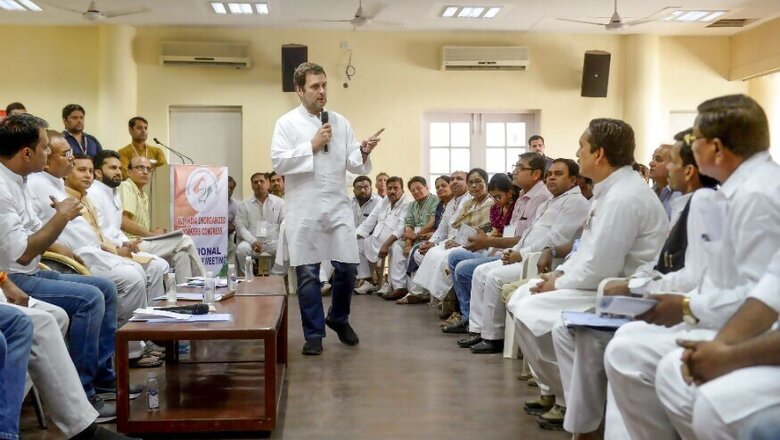
views
New Delhi: Will the 2019 general elections mark the breakdown of the bipolar political order? The electoral landscape has never appeared more fragmented, or disposed towards a fluid multipolarity. In other words, it can no longer be said that only two coalitions have a chance of capturing power.
Two reasons are cited in support of this view. First, the two-coalition system of the last two decades, in which alliances formed around the dominant players, no longer obtains. With the attenuation of the Congress from 2014 onwards, the challenge to the BJP's hegemony comes from regional forces. So, Telangana Chief Minister K Chandrashekar Rao (KCR) could be right when he says that a multipolar political system is within the realm of possibility.
In addition, the Congress and BJP are in a direct contest in just 125 seats, in Gujarat, Rajasthan, Madhya Pradesh, Himachal Pradesh, Uttarakhand, Haryana and, to a considerable extent, in Karnataka. In coalition, they are in direct competition in Maharashtra, Punjab and Jharkhand. By contrast, regional players are dominant in 300 seats: Tamil Nadu, Uttar Pradesh, Bihar, Andhra, Telangana, Odisha, J&K and West Bengal.
On the flip side, the Congress still qualifies as a national party and not just in the technical sense. It won 10.7 crore votes in 2014, against 17.2 crore for the BJP. Prima facie, this argues that Indian politics is still inherently bipolar. The BJP secured a disproportionate share of seats by successfully aggregating votes at the constituency level.
The big question for regional players is whether to unite and become a national force to reckon with, or align themselves separately with the traditional coalitions. Being fed up with the BJP's hegemony does not translate into support for the Congress.
Whether or not the Congress is 'like-minded' is a non-issue; the question is what it can bring to the table. Self-interest is a more effective glue than ideology. The NCP and JMM may need the Congress in their respective states, but its capacity for value-addition vis-a-vis other regional forces is limited, or nil. It is a marginal player in UP, Bihar, TN, Odisha, Andhra and West Bengal.
In the past, the numerical strength of the Congress has always been greater than all of its allies put together. Even in Congress-supported federal front experiments, the balance of numbers was with the grand old party. But if an alliance of opposition parties was formed today, it would be hopelessly outnumbered. Just the TMC and TRS together have more MPs than the Congress.
Yet, the Congress cannot conceive of a coalition without Rahul Gandhi at the helm and party general secretary Ashok Gehlot has already said as much. The rank-and-file, he said, will never concede leadership to another party. The Congress will not stoop to conquer.
In the parallel efforts to rally the Opposition, the elephant in the room is the role of the Congress. It has become a sticking point as Mamata Bannerjee, Sharad Pawar and KCR have differing views, which are proving very difficult to reconcile.
Pawar and Laloo Yadav insist that the Congress must be part of an opposition coalition. Mamata acknowledges that, but feels the Congress should not be at the helm. KCR has no interest in on-boarding the Congress, his main opposition, in his proposed Federal Front. He believes that both Congress and BJP have failed and it is time for regional forces to take a hand in national politics.
Mamata's idea, that the Congress should 'support' the dominant regional force in one-to-one fights against the BJP, will be a hard sell. After all, the Congress is trying to revive. The question does not arise in Telangana and Kerala, where it is the main opposition. But even in UP, Congressmen are already jittery at the prospect of surrendering their seats to the SP-BSP.
The Congress finds itself in a Catch-22 situation. A Congress-led pre-electoral coalition seems unlikely but even if it materialises, the fearless leader would find himself in a presidential contest with Narendra Modi, the one thing he would like to avoid.
The advantage of Mamata's plan is that it leaves the leadership question for later, but reduces the Congress to a multi-state rather than a pan-India player. And even if the Congress emerges as the single largest party, there's no guarantee that he will be the leader.
(The writer is a senior journalist. Views are personal)



















Comments
0 comment